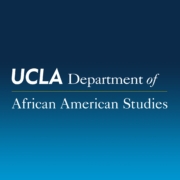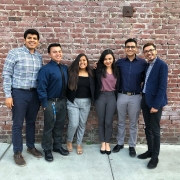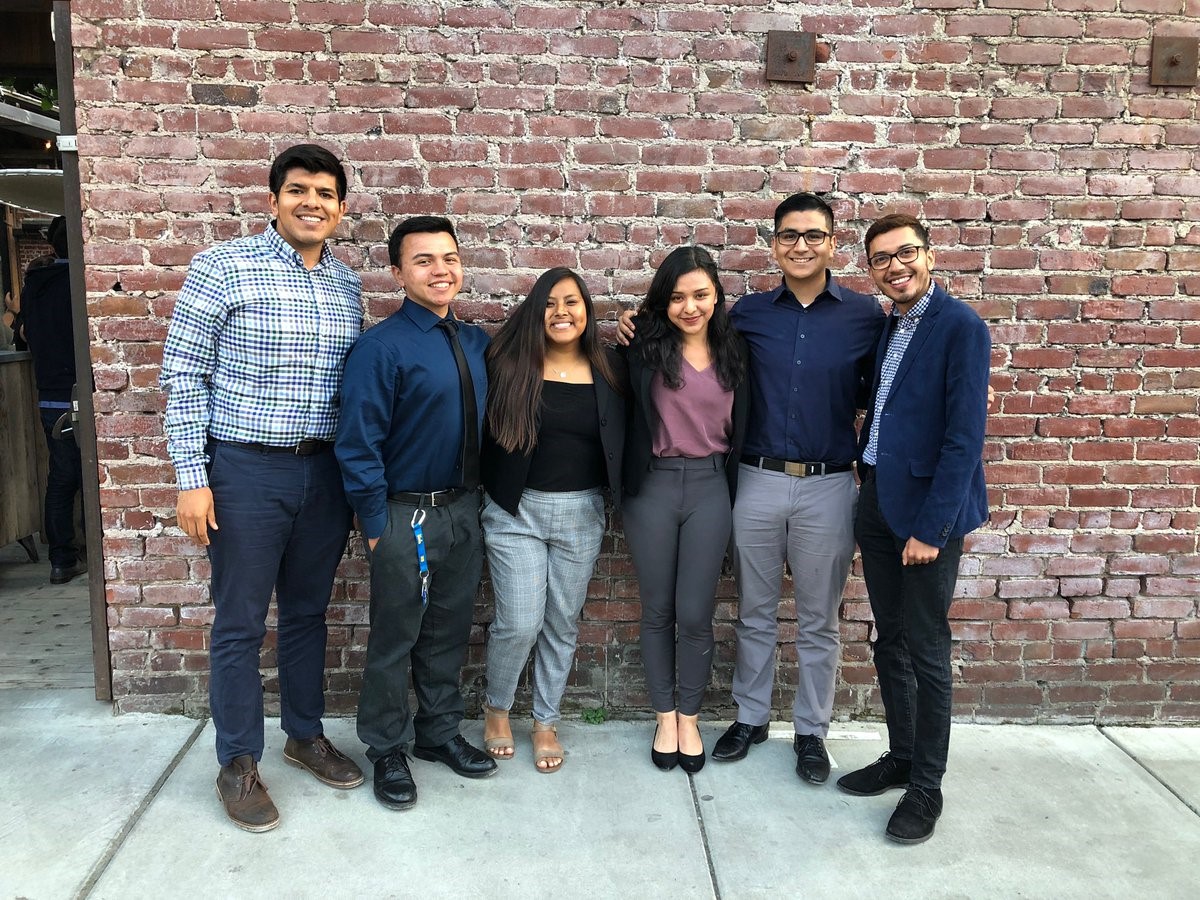
Taking a photo outside of the restaurant where we discussed the advent of graduate school and the best way to use our time during Undergrad. (From left to right: Gilberto Mendoza. Amado Castillo, Celina Avalos, Vianney Gomez, Julio Mendez Vargas, and Eduardo Solis)
By Amado Castillo and Eduardo Solis
With over 1,000 organizations at UCLA, it is difficult for undergraduates to carve out a place and establish a presence on campus. In 2017, UCLA’s Division of Social Sciences and the Luskin School of Public Affairs incubated a new avenue for undergraduates to engage with faculty on community-facing policy issues–the Latino Policy & Politics Initiative (LPPI).
“From the first LPPI event I ever attended, a lunchtime conversation with my Assemblywoman Cristina Garcia, I felt that it was an important organization as it connected policymakers with the academics who are studying the community conditions that they are trying to remedy. The idea of working at a rapid-pace think tank was daunting at first, but after my initial meeting with Sonja Diaz, I found that while there is an expectation for professionalism and a strong work ethic, there is a definite sense of community. I am very grateful to get to work with and learn from peers of mine who are definitive forces of change on our campus.” -Amado
“Throughout my first two years at UCLA, I was uncertain on what career I wanted to pursue. However, having taken a course on immigration policy made me aware to the fact that policy is what affects marginalized communities the most. During my interview to be a policy fellow, I was greeted by Sonja’s dog, Junot, and then later, Senate pro Tempore Kevin de León! This is emblematic of the space that LPPI convenes; something both accessible and powerful.” -Eduardo
As new policy fellows, we spent the first few weeks transitioning into our roles through the mentorship and guidance of current undergraduate and graduate policy fellows. We gained invaluable knowledge during the first half of spring quarter and became accustomed to working as a collective in a professional setting. During the third week, Sonja Diaz (LPPI’s Founding Executive Director) invited us to participate in a professional development opportunity with Bay Area professionals. We met with professionals of color from a handful of important sectors who imbued us with the knowledge of what it meant to lead with a social justice mindset. Diaz explained to us that the people we were going to meet with all worked in different sectors, all of which are woefully lagging on issues of diversity and inclusion. These sectors include the philanthropy, tech, and healthcare industry.
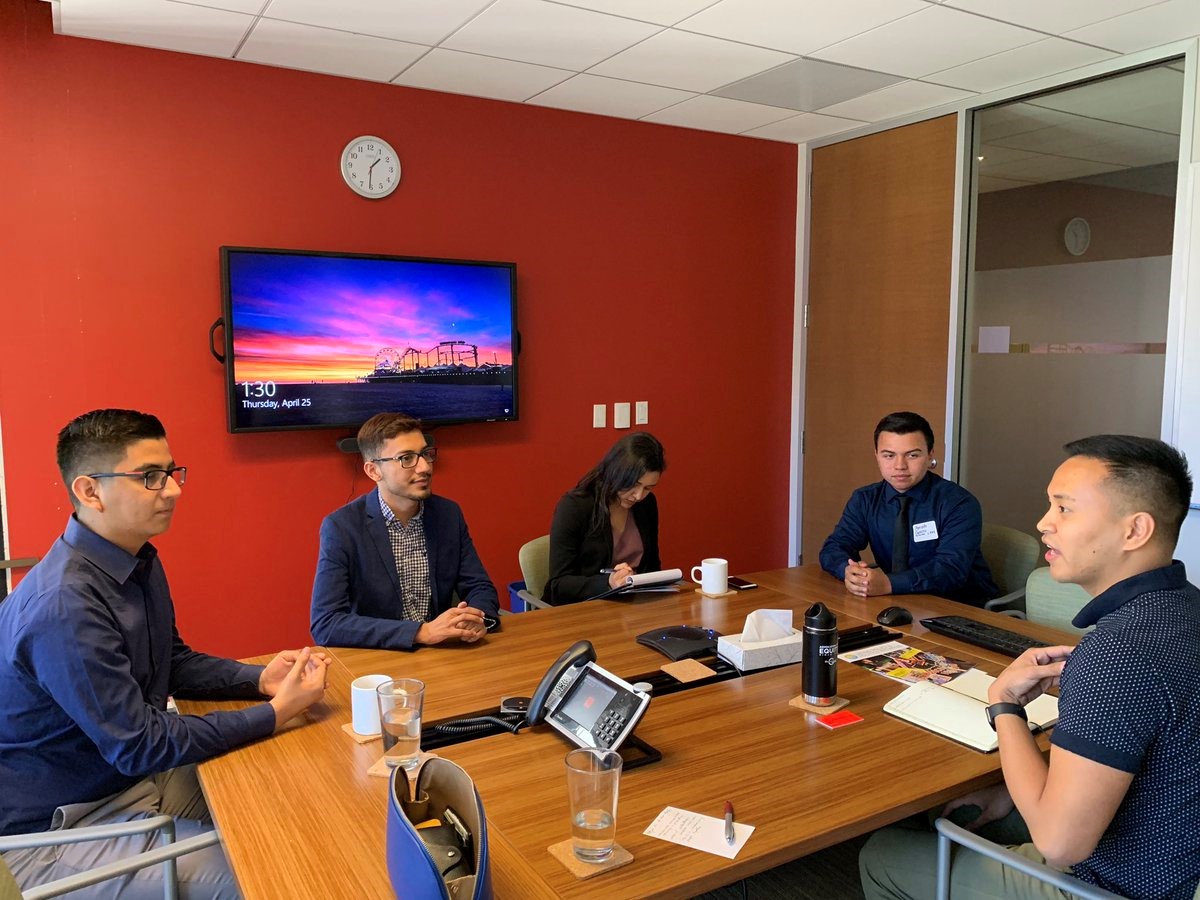
Policy Fellows gaining insight and taking notes while JC discusses how philanthropy can be utilized to uplift communities of color (From left to right: Julio Mendez Vargas, Eduardo Solis, Vianney Gomez, Amado Castillo and JC De Vera)
When we got to our first meeting, we met JC De Vera who works as a Program Grantmaker at the San Francisco Foundation in the Embarcadero building. He explained to us how fulfilling his job is, working within the philanthropy sector to mobilize and move resources to fuel advocacy. De Vera explained the importance of the intersections of advocacy and philanthropy, specifically how grant allocations have a significant impact on which organizations flourish and which die. He described to us how many people do not enjoy working in philanthropy because they anticipate having to go through a lot of bureaucratic red tape. However, De Vera is grateful that he gets to manage a rapid response power fund. He expressed, “I need to have an impact in my life and my career. If not, it’s not the job for me.” De Vera concluded our meeting by reiterating how for him, work has always been about lifting up people from the margins and giving them the financial assistance to do so.
At our next stop we connected with Hector Preciado at his Hired office, which looked and felt like the way tech companies are portrayed in television and film. He provided a different/contrary approach, inviting us to think about doing business school. He explained the importance of having executives in tech companies with a socio-political consciousness, as it is integral that Latinos become a part of the next wave of moguls if we want to ensure success within our community. Preciado also emphasized the importance of networking, describing how many doors had been opened for him and how many he has had the opportunity to open for others. Still, he cautioned us that networking was not a volume game, but rather a value game, and the worth is in its diversity.
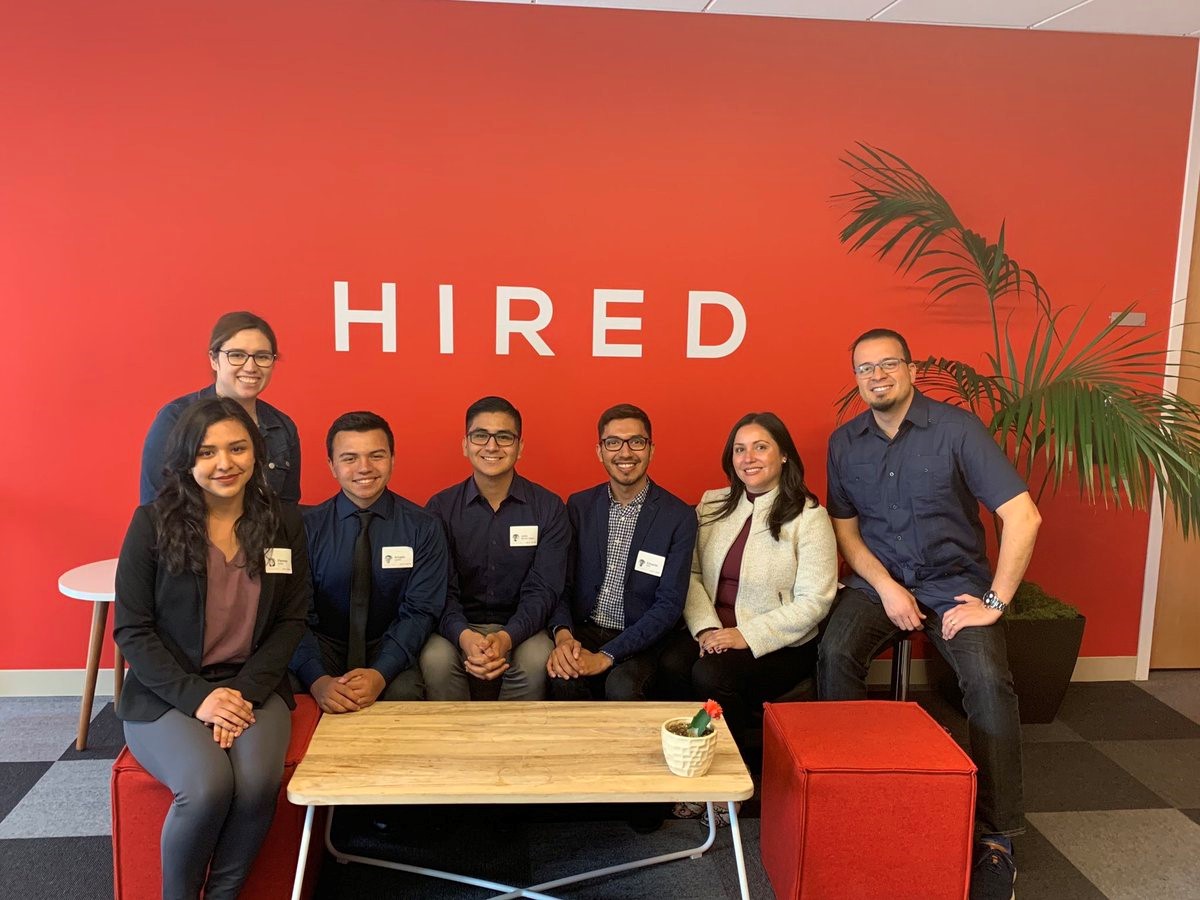
Group photo taken after our meeting with Hector Preciado at Hired where he emphasized the importance of having socially-conscious Latinos in positions of power at influential corporations. (From left to right: Rosie Serrato Lomeli, Vianney Gomez, Amado Castillo, Julio Mendez Vargas, Sonja Diaz, and Hector Preciado)
Our final meeting took place over dinner near Oakland’s City Center where we met with Gilberto Soria Mendoza, a previous mentee of Diaz from her days at UCLA. He offered us suggestions about graduate school and described his journey from East Palo Alto high school to Washington, D.C. and back. Mendoza was incredibly personable and gave us guidance about how we could best use our experiences at UCLA to benefit our professional and academic futures. He described to us how he managed to complete his master’s degree nearly debt-free and encouraged us to apply to professional programs that focus on helping students of color prepare for graduate school.
In all, these meetings provided a sense of security and inspiration for what our futures could entail. The sectors that De Vera, Preciado, and Mendoza occupy weren’t made for them or us. As such, seeing people of color taking up positions in these sectors that have been historically dominated by white people sparked a sense of motivation within us to follow their footsteps. It gives us hope that we too will accomplish our career goals in taking up leadership positions in sectors that were not structured for people that look like us.

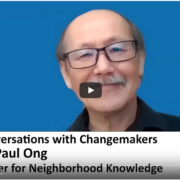
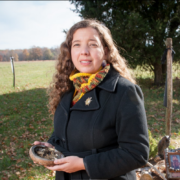

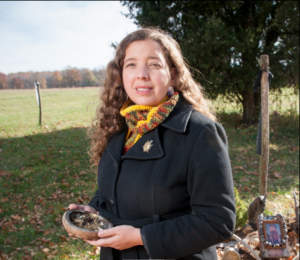

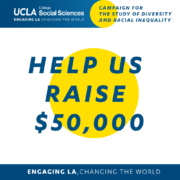
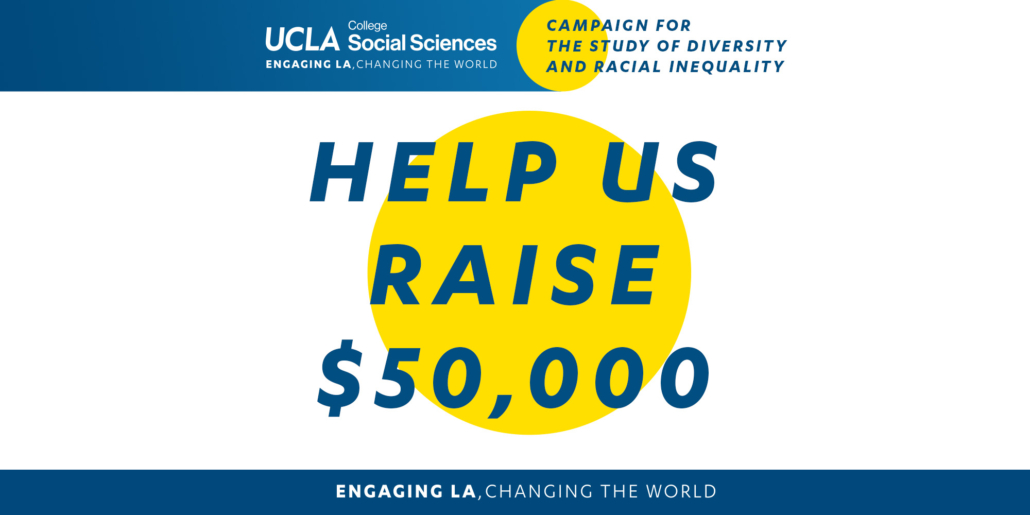
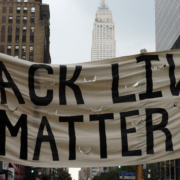
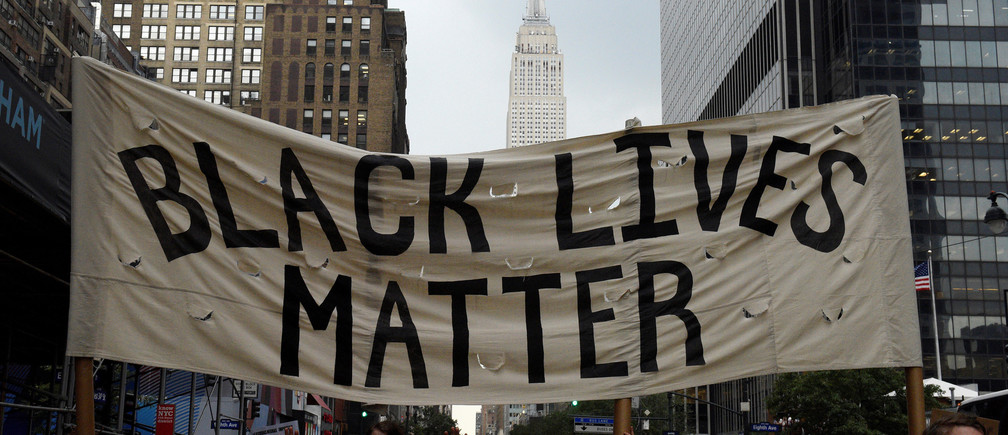

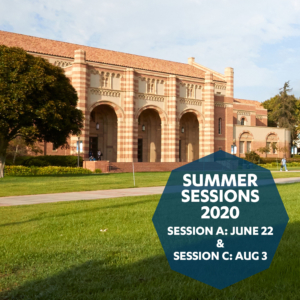 Have you always wanted to take a course in the social sciences?
Have you always wanted to take a course in the social sciences?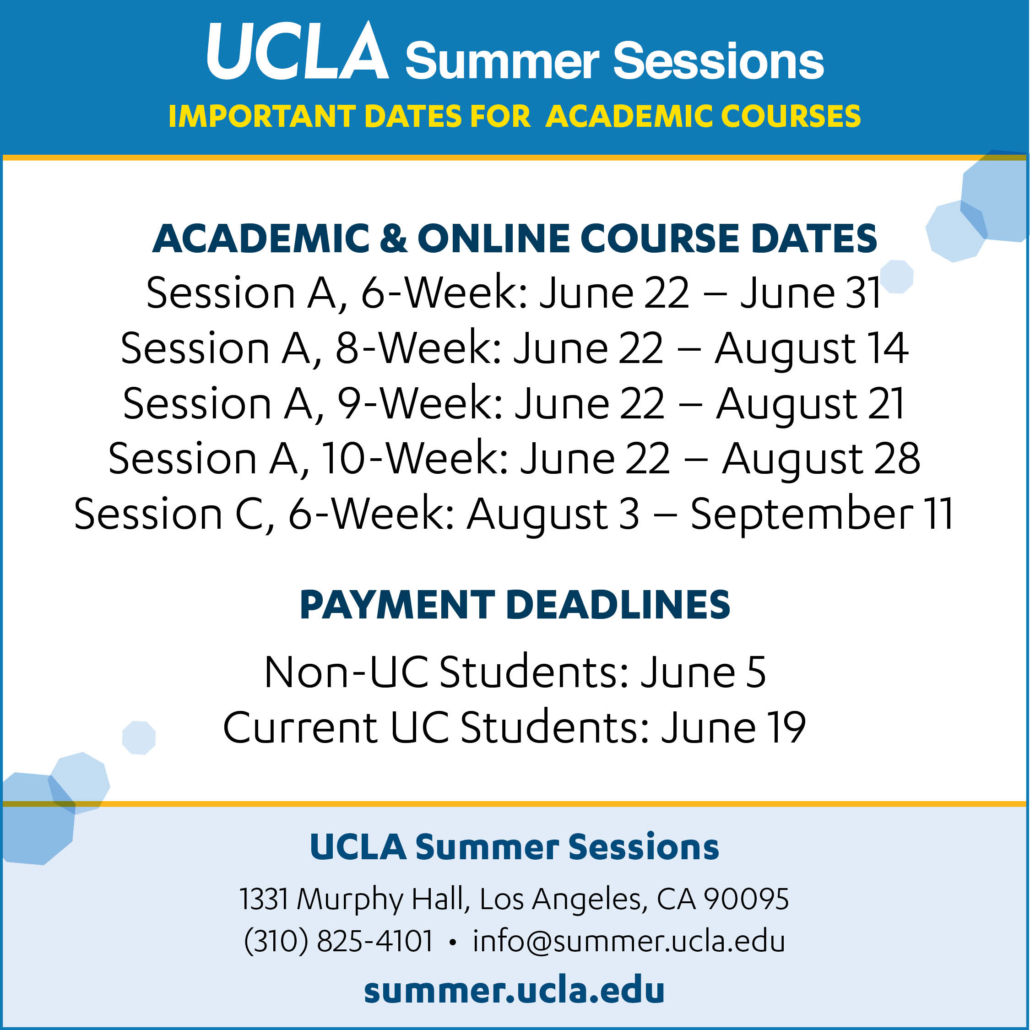
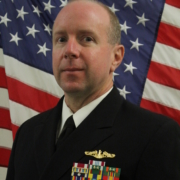
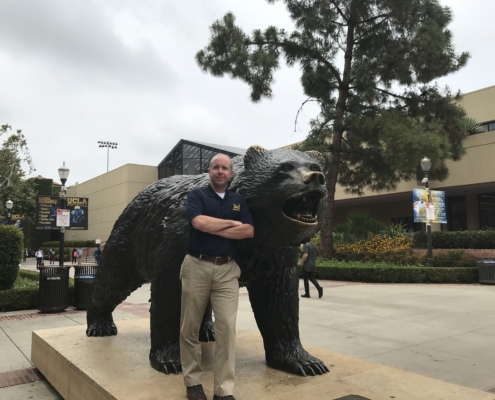 Currently in his second year in the UCLA EMBA program, Commander Hill says the biggest strength of the program is the quality of the students who contribute so much to the discussions, because they come from all backgrounds and walks of life. One of the current projects he is working on is part of his culmination thesis where a group of five students are partnered with a community organization and are given a real-life problem to solve. His group is specifically working with the Chief Information Officer for the City of Santa Monica on a business exploratory project. Commander Hill has used his prior military experience to make huge advances in the project and solidify strong relationships with city agents.
Currently in his second year in the UCLA EMBA program, Commander Hill says the biggest strength of the program is the quality of the students who contribute so much to the discussions, because they come from all backgrounds and walks of life. One of the current projects he is working on is part of his culmination thesis where a group of five students are partnered with a community organization and are given a real-life problem to solve. His group is specifically working with the Chief Information Officer for the City of Santa Monica on a business exploratory project. Commander Hill has used his prior military experience to make huge advances in the project and solidify strong relationships with city agents.